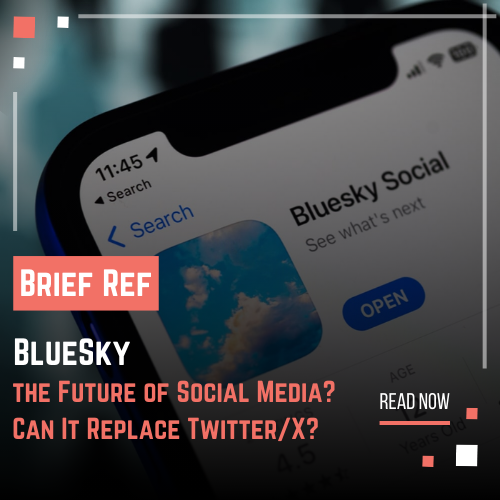BlueSky the Future of social media
In the ever-evolving world of social media, platforms rise and fall in the blink of an eye. But in the case of Twitter, now rebranded as X under Elon Musk’s ownership, many are beginning to wonder: is there a new contender on the horizon that could take its place as the go-to social network for real-time conversation, breaking news, and public discourse BlueSky the Future of social media?
That contender is BlueSky, a decentralized social network founded by none other than Jack Dorsey, co-founder of Twitter. But could BlueSky really replace Twitter/X? In this post, we’ll dive into what BlueSky is, how it works, and why it might be poised to become the next big thing in social media.
What is BlueSky?
BlueSky is a decentralized social network that aims to take a radically different approach from traditional platforms like Twitter/X, which are typically controlled by a central authority. BlueSky’s key innovation is that it runs on a protocol called AT Protocol, which allows anyone to create their own version of the network. Instead of all data being managed by one company, users have more control over how their data is stored and shared, and they can even choose the algorithm that governs the content they see.
The vision behind BlueSky is to create a more open, user-centric version of social media. By decentralizing control, BlueSky the Future of social media hopes to avoid some of the pitfalls that have plagued Twitter/X and other platforms: issues like censorship, privacy violations, and the toxic effects of algorithmic manipulation.
How Does BlueSky Compare to Twitter/X?
At first glance, BlueSky the Future of social media may seem similar to Twitter/X in some respects. Both platforms aim to enable real-time communication, connect people around the world, and serve as digital public squares for discussion. But there are several key differences that could position BlueSky as a potential alternative—or even replacement—for Twitter/X.
- Decentralization vs. Centralization
Twitter/X is a centralized platform, meaning that everything is controlled by one company (currently owned by Elon Musk’s X Corp.). In contrast, BlueSky’s decentralized nature means that no single company owns the platform. Instead, it operates more like a network where different “apps” or platforms can interconnect, while still allowing users to maintain control over their own data and content. - Open Standards and Customization
One of BlueSky the Future of social media most promising features is its open standards and the ability to customize the platform. With the AT Protocol, developers can create different algorithms, moderation tools, and even user interfaces. This level of flexibility is something Twitter/X can’t offer. If users don’t like how content is displayed or moderated on BlueSky the Future of social media, they can switch to another app using the same protocol that might better align with their preferences. - Focus on Privacy and User Control
BlueSky places a strong emphasis on user privacy and control over personal data. With growing concerns around how tech giants handle user information, BlueSky’s decentralized approach could help address some of the privacy issues that have plagued Twitter/X. On BlueSky, you’re not just a product to be monetized; you have more ownership of your data. - No Algorithmic Manipulation—At Least Not in the Same Way
Twitter/X has faced significant criticism for its algorithm-driven content curation, which many argue contributes to the spread of misinformation and divisive content. While BlueSky still uses algorithms to surface content, users have more control over how these algorithms work. In theory, this could create a more user-focused experience that avoids the negative consequences of algorithmic bias. - A Fresh Start for Community Building
One of the criticisms of Twitter/X under Musk’s leadership has been the decline of trust within its community. The platform has struggled with moderation challenges, a rise in harassment, and the reinstatement of controversial accounts. BlueSky offers a fresh opportunity to rebuild social media communities in a healthier way, with a focus on decentralization, trust, and transparent moderation practices.
Why People Think BlueSky Could Replace Twitter/X
- The Decline of Twitter/X
Under Elon Musk’s leadership, Twitter has faced significant turbulence. From changes to the verification system to the controversial introduction of paid subscriptions, many longtime users have become disillusioned with the platform. With its rapid changes, layoffs, and user experience issues, Twitter/X seems to be losing its status as the social media platform of choice for public discourse. This has created an opening for alternatives like BlueSky to fill the void. - Growing Interest in Decentralized Platforms
As people become more aware of the limitations and risks associated with centralized platforms, there’s a growing interest in decentralized social media. BlueSky offers a promising alternative for those who want more control over their online experience. Its transparency, emphasis on privacy, and potential for more balanced moderation could make it especially attractive to users who are tired of corporate-driven platforms like Twitter/X. - The Power of Community and Early Adoption
BlueSky has already garnered attention from early adopters who value its open, decentralized nature. Many of these users are eager to see the platform succeed and are already creating communities that reflect their values. As more people join the network and the platform evolves, it could become a significant challenger to Twitter/X, especially among tech-savvy and privacy-conscious users.
Will BlueSky Replace Twitter/X?
While BlueSky the Future of social media is still in its early stages, it’s clear that it offers a different kind of social media experience that could appeal to a significant segment of users. However, whether it can truly replace Twitter/X depends on several factors.
For one, BlueSky’s growth and adoption will need to accelerate. The platform currently has a more niche user base, and many people are still unfamiliar with its decentralized approach. Twitter/X, for all its issues, still has a massive user base and a central place in global conversations. For BlueSky to gain real traction, it will need to overcome the challenge of reaching a wider audience while maintaining the ethos of decentralization.
Moreover, BlueSky’s ability to manage scaling issues, ensure platform security, and develop a sustainable business model will be crucial. While the promise of a decentralized, user-first platform is compelling, it’s still too early to say whether it can reach the mainstream in the same way Twitter/X has.
Conclusion: The Future of Social Media is Up for Grabs
BlueSky’s decentralized model represents an exciting shift in the social media landscape. Whether it can replace Twitter/X remains to be seen, but the potential is there. The platform’s emphasis on privacy, user control, and transparency stands in stark contrast to the centralized, often controversial nature of Twitter/X under Elon Musk’s leadership.
In the end, the future of social media will likely be shaped by user demands for more privacy, more control, and a better overall experience. If BlueSky the Future of social media can meet these demands, it may very well become the new home for public discourse, replacing Twitter/X as the platform of choice for millions of users.
So, is BlueSky the next big thing in social media? Only time will tell, but it’s certainly one to watch as the battle for the future of online interaction continues to unfold.




